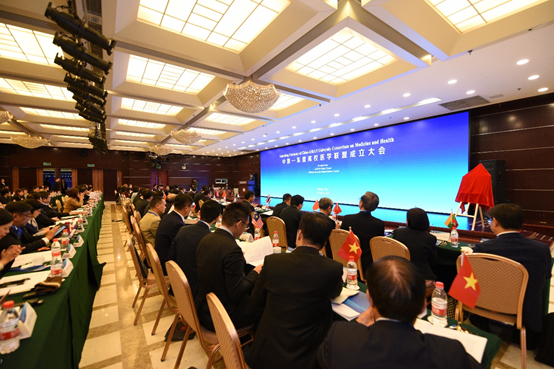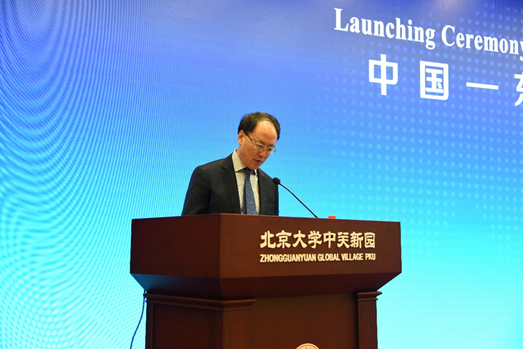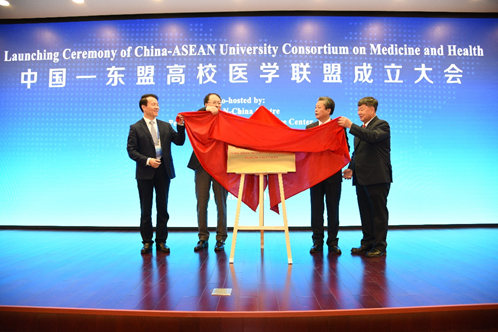
On 14 October 2019, the launching ceremony of the ASEAN-China University Consortium on Medicine and Health, co-hosted by ASEAN-China Centre (ACC) and Peking University Health Science Center(PKUHSC), was successfully held at Peking University. The Beijing Statement of the ASEAN-China University Consortium on Medicine and Health was released.
The Consortium is established by PKUHSC with the support of ACC to promote medical cooperation between ASEAN countries and China. It aims to strengthen in-depth exchanges and collaboration among medical universities and institutions of ASEAN countries and China in the fields of medical education, research and healthcare, promote common development of medical education and research in the region, improve the quality of medical personnel training and healthcare service, so as to make contributions to improving people’s health and promoting global medical cause.

Mr. Fang Jun, Deputy Director-General of the Department of International Cooperation and Exchanges of the Ministry of Education of China, Mr. Chen Dehai, Secretary-General of ACC, Prof. Zhan Qimin, Executive Vice President of Peking University and President of PKUHSC, attended the ceremony and delivered remarks. Presidents and deans of 24 medical universities and colleges from 9 ASEAN countries and 21 counterparts from China attended the meeting.
Deputy Director-General Fang Jun extended warm congratulations on the establishment of the Consortium. He hoped that the Consortium could make its contributions to people-to-people exchanges between ASEAN and China, and strengthen exchanges and mutual learning for common progress in the field of medical education, research and healthcare services so as to improve health of people in the region and contribute to the development of education and health undertakings in the region and beyond.

Secretary-General Chen Dehai stated in his remarks that the establishment of the Consortium is another important endeavour to deepen ASEAN-China friendly exchanges and practical cooperation in education. He believed that the Consortium members will make best use of the platform to jointly enhance the capacity of talent cultivation, strengthen collaborative research and innovation, and promote integrated development of education, medical service, research and industry, so as to make contributions to building ASEAN-China health community with a shared future and bring tangible benefits to people in the region.

Prof. Zhan Qimin called on the Consortium members uphold the Silk Road spirit of "peace and cooperation, openness and inclusiveness, mutual learning and mutual benefit", adhere to the principles of extensive consultation, joint contribution and shared benefits, and follow the theme of comprehensively improving the health and well-being of the people of ASEAN and China, in their efforts to promote cooperation and exchanges in the fields of medical education, research and healthcare, create a multilateral and bilateral cooperation mechanism and new cooperation models, and jointly build the path to regional health, thus making regional contributions to the global health undertaking.
During the launching ceremony, Deputy Director-General Fang Jun, Secretary-General Chen Dehai, PKU Vice President Zhan Qimin and President Banchong Mahaisavariya of Mahidol University of Thailand jointly unveiled the ASEAN-China University Consortium on Medicine and Health.

Prof. Ari FahrialSyam, Dean of Faculty of Medicine Universitas Indonesia and President of the ASEAN Medical School Network, Prof. Zhang Qin, Vice President of Peking Union Medical College, Prof. Banchong Mahaisavariya, President of Mahidol University, Prof. Wu Fan, Vice President of Shanghai Medical College of Fudan University, Prof. Kiat Ruxrungtham, Vice President of Chulalongkorn University, Prof. Chen Lizhang, Vice President of Central South University, Prof. Lau Tang Ching, Vice Dean of NUS Yong Loo Lin School of Medicine, and Prof. Zhang Lin, Vice President of Sichuan University delivered remarks respectively to share their experience on international cooperation in the field of medicine and health, as well as their vision of the future development of the Consortium.

During the roundtable discussion in the afternoon, Council members of the Consortium discussed and adopted the charter of the Consortium, and had discussions on the short-term and long-term action plans of the Consortium.